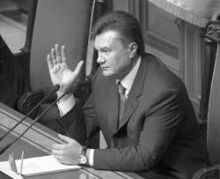It is sad but true: a large part of the Ukrainian population is opposed to NATO membership. Can public opinion be changed in a short while?
Ukraine’s recent history knows cases when public opinion made an about-face dramatically and quickly. In March 1991, 70 percent of the Ukrainian population voted for preserving the Soviet Union, but by December practically 90 percent cast their ballots for an independent Ukrainian state. True, there was complete consensus among the elites by the end of 1991. Not a single political force, not even the communists, opposed the independence idea.
Political technologist Oleh Medvedev is convinced that reshaping public opinion quickly is possible even now, if this project is approached seriously. “The outcome of the referendum on Ukraine’s NATO membership largely depends on the elites,” he says. “One scenario is if this referendum is conducted by Yushchenko and actively supported by Viktor Yanukovych and his political force. In this case a positive outcome is guaranteed.
“Another scenario would be if the referendum were organized by Yushchenko with Yanukovych remaining neutral, allowing the communists and Vitrenko to conduct counterpropaganda. Such a referendum would be more complicated. Still, even this scenario can secure a positive vote.
“The third option is a referendum organized by the president with Yanukovych and the Party of Regions actively opposing it. Here the outcome is unpredictable.”
The implication is that the decision to join NATO, and how quickly, depends on Yanukovych. Medvedev believes that the unreadiness of public opinion is a secondary factor. Yanukovych’s stand is paramount.
What is Yanukovych’s actual stand on NATO? The answer seems apparent: Yanukovych is against it. After all, on Sept. 14 he declared in Brussels that Ukraine is not ready to join the Membership Action Plan. However, not everything is as simple as meets the eye. In a recent interview with the Frankfurter Allgemeine, Prime Minister Yanukovych admitted that “Ukraine has not altered its orientation toward NATO; joining the Euro-Atlantic space remains our strategic objective.”
When he was asked to specify whether this means NATO membership, Yanukovych said loudly and clearly: “Yes. No one wants to change this goal. We must, however, be open. Acceleration of the past two years has produced only negative consequences. In the past two years the number of Ukrainians who oppose NATO membership has increased by 20 percent.” Stunned, the Germans asked why. “Because no one has explained to the people what NATO is all about,” replied Yanukovych in the words of President Yushchenko.
About a month ago the Washington Post published an article by Yanukovych, who said that Ukraine will become the center of the Euro-Atlantic world. Finally, on Nov. 18, during the conference “Ukraine’s Road to Mature Statehood” a Ukrainian foreign ministry official, Volodymyr Handohii, told the Western participants that both the president and the prime minister are in favor of Euro-Atlantic integration. There are no strategic differences between them, and they merely have their own views on the tactic on moving in the direction of the North Atlantic alliance.
Medvedev, who attended the conference, is convinced that Yanukovych is sincere when he talks to European journalists. “Personally, I became convinced that Yanukovych is for Ukraine joining NATO. Another thing is that the people who are setting Yanukovych’s foreign policy course are doing two things: first, they are constantly looking over their shoulders at Russia; second, they are trying to play Kuchma’s multivector game. So they say one thing in Washington, something else in Ukraine, and perhaps something else in Russia.”
Hryhorii Nemyria, a member of Ukraine’s parliament, also attended the conference in Washington. He has a completely different take on this issue. He noted that Yanukovych is rallying people who used to deal with Ukraine’s foreign policy professionally. On the one hand, cabinet’s role in making foreign policy decisions has considerably increased after the constitutional reform, but “the concentration of people of this caliber and in such numbers around the prime minister actually indicates the creation of a parallel foreign policy agency.” At the same time, the Ministry of Foreign Affairs of Ukraine is becoming marginalized.
However, the main focus of attention is the recent events surrounding Ukraine. Apart from the fact that Yanukovych slowed down the MAP in Brussels (although by and large the Membership Action Plan has very little to do with NATO membership), it is obvious that the issue of WTO membership is also being held in check. The third aspect is that Yanukovych is sending signals to Moscow that the presence of the Russian Black Sea Fleet in Ukraine may be extended after 2017.
A number of experts believe that Yanukovych is doing all this expecting some preferential treatment from Russia. However, recent events have shown that there are no prospects for receiving any concessions from Russia. Just like in the days of the “Orange” Yekhanurov, Russia has increased the gas price by 40 dollars with the “White-and-Blue” prime minister in office. In fact, Russia’s Ambassador to Ukraine, Viktor Chernomyrdin, has said that 130 dollars is a gift. In other words, Ukraine is supposed to owe Russia this “favor.” Now we are seeing Gazprom pressuring Belarus, Russia’s most loyal ally.
One can only hope that the more Yanukovych comes face to face with Russia’s everyday policies, the quicker he will realize the need to integrate into the Euro-Atlantic space — and the sooner the better.







